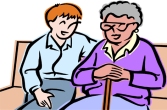When it comes to reversing memory decline and rejuvenating your brain, take heart! There’s hope for us, regardless of age. That’s the central message of a “Remember This” seminar recently held at Charles E. Smith Life Communities, where I’m the director of Dementia Programs.
In “How to Boost Your Memory and Brain Performance – at Any Age,” Majid Fotuhi, MD, PhD laid out solid information and important, easy-to-follow advice that boils down to sticking to a physical exercise regime, finding ways to stimulate your mind, and following doctors’ orders to improve serious medical conditions. Dr. Fotuhi is considered one of the world’s leading brain experts and an authority in the field of memory and aging. Starting with some basic physiology, Dr. Fotuhi explained that with aging, the brain’s hippocampus – shaped like a small sea horse and responsible for short-term memory – shrinks by about 0.5% per year after age 50. That’s hardly an insignificant loss when added up over a decade or more. Factors that can contribute to shrinkage are:
- Diabetes and hypertension, uncontrolled
- Obesity
- Stroke
- Sleep Apnea, uncontrolled
- Stress
- Concussion
- Depression
What steps can we take to improve blood flow to the brain and help prevent or reverse this shrinkage? Dr. Fotuhi advises taking clear – and doable – steps, with some examples, to turn things around. While these tips will not reverse memory loss caused by Alzheimer’s disease, they can help make our brains “younger:”
- Get fit. Walking a mile a day five times per week can make a positive difference in just a few weeks. If knees hurt, try walking in a swimming pool.
- Tease your memory. Memorize things; for example, learn one or two names a day. Study something new.
- Eat well and add DHA, specifically omega-3 fatty acid, to your diet. Eat a heart-healthy diet to increase blood flow to the brain.
- Sleep. A full night of rest every night works miracles.
- Relax your mind. Stress can be toxic and rarely solves problems. Try meditation.
“The brain is forgiving and can bounce back, “says Dr. Fotuhi encouragingly. Never say you’re too old to make changes; be positive and show confidence!








